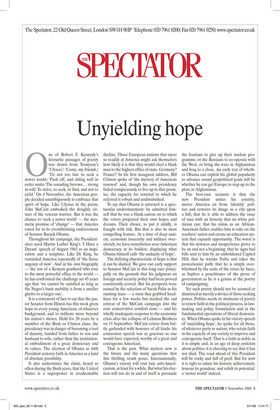Unyielding hope
One of Robert F. Kennedy’s favourite passages of poetry was drawn from Tennyson’s ‘Ulysses’: ‘Come, my friends,/ ’Tis not too late to seek a newer world./ Push off, and sitting well in order smite/ The sounding furrows... strong in will/ To strive, to seek, to find, and not to yield.’ On 4 November, the American people decided unambiguously to embrace that spirit of hope. Like Ulysses in the poem, John McCain embodied the doughty virtues of the veteran warrior. But it was the chance to ‘seek a newer world’ — the mesmeric promise of ‘change’ — that America voted for in its overwhelming endorsement of Senator Barack Obama.
Throughout his campaign, the Presidentelect used Martin Luther King’s ‘I Have a Dream’ speech of August 1963 as an inspiration and a template. Like Dr King, he reminded America repeatedly of ‘the fierce urgency of now’. And in his own biography — the son of a Kenyan goatherd who rose to the most powerful office in the world — he has confronted the challenge set 45 years ago that ‘we cannot be satisfied as long as the Negro’s basic mobility is from a smaller ghetto to a larger one’.
It is a statement of fact to say that the junior Senator from Illinois has this week given hope to every young American, of whatever background, and to millions more beyond his nation’s shores. Held for 20 years by a member of the Bush or Clinton clans, the presidency was in danger of becoming a tool of dynasty, handed from father to son and husband to wife, rather than the institutional embodiment of a great democracy and its values. The election of Obama as 44th President restores faith in America as a land of absolute possibility.
It also undermines the claim, heard so often during the Bush years, that the United States is a superpower in irredeemable decline. Those European nations that sneer so readily at America might ask themselves how likely it is that they would elect a black man to the highest office of state. Germany? France? In his first inaugural address, Bill Clinton spoke of ‘the mystery of American renewal’ and, though his own presidency failed conspicuously to live up to that promise, the capacity for renewal to which he referred is robust and undiminished.
To say that Obama is untested is a spectacular understatement: he admitted himself that he was a blank canvas on to which the voters projected their own hopes and dreams. Their choice, to put it mildly, is fraught with risk. But that is also its most compelling feature. At a time of deep anxiety, economic insecurity and military overstretch, we have nonetheless seen American democracy at its boldest: displaying what Obama himself calls ‘the audacity of hope’.
The defining characteristic of hope is that it can be dashed. We gave our early support to Senator McCain in this long race principally on the grounds that his judgment on foreign and security policy had been proved consistently correct. But his prospects were ruined by the selection of Sarah Palin as his running mate — a stunt that grabbed headlines for a few weeks but marked the sad retreat of the McCain campaign into the core conservative comfort zone — and his wholly inadequate response to the economic crisis after the collapse of Lehman Brothers on 15 September. McCain retires from battle garlanded with honours of all kinds: his concession speech was as gracious as one would have expected, worthy of a great and courageous American.
That is the past. What matters now is the future and the many questions that this thrilling result poses. Internationally, Obama’s victory will rout lazy anti-Americanism, at least for a while. But what his election will not do in and of itself is persuade the Iranians to give up their nuclear programme, or the Russians to co-operate with the West, or bring the wars in Afghanistan and Iraq to a close. An early test of whether Obama can exploit his global popularity to advance sound geopolitical goals will be whether he can get Europe to step up to the plate in Afghanistan.
The best-case scenario is that the new President unites his country, moves America on from ‘identity’ politics and restores its image as a city upon a hill; that he is able to address the issue of race with an honesty that no white politician can; that his status as an AfricanAmerican father enables him to take on the teachers’ union and create an education system that expands opportunity. The worst is that his newness and inexperience prove to be an end not a beginning: that he signs bad bills sent to him by an emboldened Capitol Hill; that he wrecks Nafta and takes the protectionist path; that he is simply overwhelmed by the scale of the crises he faces, as hapless a practitioner of the prose of government as he is a genius at the poetry of campaigning.
Yet such poetry should not be scorned or dismissed as merely a device of those seeking power. Politics needs its moments of poetry to renew faith in the political process, in lawmaking and policy formulation and in the fundamental operations of liberal democracy. When Obama spoke in his victory speech of ‘unyielding hope’, he spoke for all those, of whatever party or nation, who retain faith in the capacity of any society to improve and reinvigorate itself. That is a faith as noble as it is simple and, in an age of deep cynicism about politics, it is cheering to see that it has not died. The road ahead of this President will be rocky and full of peril. But for now it is right to salute his historic achievement, honour its grandeur, and relish its potential: a ‘newer world’ indeed.


















































































 Previous page
Previous page